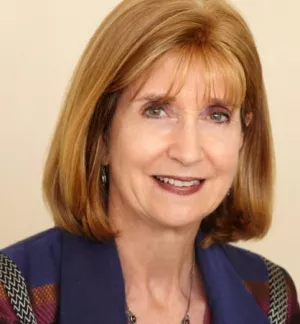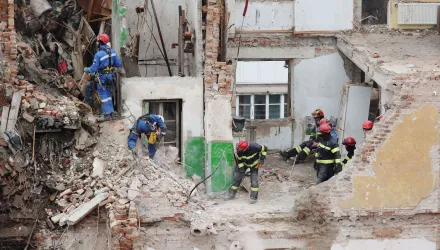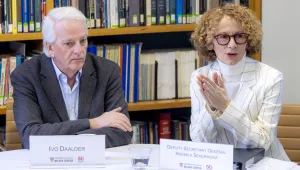
The following is an event write-up about the recent Future of Diplomacy Project (FDP) seminar on “The Geopolitics of Latin America amid the War in Ukraine and China-U.S. Tensions” moderated by Negah Angha, Fellow at the Institute of Politics, on March 29, 2023.
There are many countries in Latin America (as well as in other regions such as South Asia and the Middle East) that condemn Russia's invasion of Ukraine while pursuing a policy of not imposing sanctions, not breaking trading ties with Russia, and not exporting weapons to Ukraine. Some of those countries, like Brazil, are even interested in being part of peace efforts and promoting negotiations, independently of what the Coalition for Ukraine does. This is a paradox that P. Michael McKinley, former Ambassador to Colombia, Peru, Brazil, and Afghanistan, highlighted.
As Former Minister of Foreign Affairs of Panama, Erika Mouynes, said, “You have countries trying to figure out whether or not they have to pick a side” during this time of increasing great power competition. She defined this trend as “multi-alignment” which is a kind of non-alignment that is different from the Non-Aligned Movement of the Cold War era. It is up to each country to assess the geopolitical landscape and to make decisions on who to work with on specific issues.
Emphasizing the United Nations General Assembly Resolutions condemning Russia’s invasion, Ambassador Paula Dobriansky, FDP Senior Fellow, made the point that Latin America is not a monolith: For Resolution ES-11/4, most countries in the Western Hemisphere voted in favor; Bolivia and Cuba abstained; Nicaragua was the only country that voted against; and El Salvador and Venezuela did not vote.
Ambassador McKinley pointed to the case of Brazil which also voted in favor of the UN Resolutions despite President Lula going on record in 2022 saying that Ukraine is to blame just as much as Russia. Brazil, a member of the BRICS, maintains close economic ties to Russia which complicates its strategic calculus: As the second biggest agricultural producer in the world, Brazil imports 20-25% of its fertilizer from Russia.
“I think that countries are positioning themselves based on their trade relationships,” said Ambassador Dobriansky. She called attention to Brazil’s soybean production and trade with China as another example. Instead of “non-alignment” to describe this approach, she used Eduardo Porter’s term “optionality.” Additionally, she gave the examples of Mexico when President López Obrador condemned giving Leopard tanks to Ukraine, and Chile on the other hand, where President Gabriel Boric condemned Russia. “It's not not non-aligned (that's kind of a double negative), but I think that countries are positioning themselves based on what they see in their own self-interest.”
Regarding what U.S. foreign policy should be given these developments, Ambassador McKinley urged that non-alignment/multi-alignment/optionality is “not something that should be of the utmost concern to us. The question is whether, as [countries] watch developments and try to maintain relations with us, with Russia, with China…the United States, like it has to with other parts of the world, should try to manage that approach and see where there are convergences that can assist broader objectives we have.” However, what is concerning is the consistent relegation of the region to a “second place” priority by successive U.S. administrations, viewing it through ideological prisms alone, or dictated by 2-3 issues such as migration and Cuba.
Acknowledging that the war in Ukraine was the existential geopolitical conflict of our time, Ambassador McKinley underscored that the entire Latin American and Caribbean region received $2 billion from the U.S. whereas Ukraine received $70 plus billion last year. “We can do no better than 2 billion for a region where we say we have many concerns, not least irregular migration and the impact on the United States?... It's a deficit that really needs to be corrected if we’re going to take a strategic hemispheric approach in the context of a world that's increasing increasingly, working on the basis of regionalization.”
Similarly, Minister Mouynes lamented the second-rate prioritization of the region: “We don't talk enough about Latin America…[it] represents opportunities on a number of things: resources, critical minerals, chips [or semiconductors].” Guyana and the recent discovery of its oil and gas reserves exemplifies this promise. On the other hand, Haiti which is also ‘in the neighborhood’ has negative spillover effects on the rest of the region and requires significant attention. She also categorized U.S. foreign policy in the region as short-sighted because it is largely determined by local politics and by the preferences of Latino voters in certain U.S. states.
To end the discussion, Ambassador Dobriansky summed it up: “Hopefully, there's a wakeup call that if [the U.S. is] going to compete [with Russia and China], then we need to seize the opportunities and engage, act, and collaborate in Latin America.”
Watch the full event here.
Manouselis, Erika . “EVENT DEBRIEF: The Geopolitics of Latin America Amid the War in Ukraine and China-U.S. Tensions.” Belfer Center for Science and International Affairs, April 10, 2023







